Accounting Research Project: Education-Practice Gap and Solutions
VerifiedAdded on 2021/05/31
|14
|3987
|30
Report
AI Summary
This accounting research project investigates the gap between accounting education and practice, examining the perspectives of students, educators, and professionals. It analyzes the existing discrepancies between accounting curricula and the skills required in the workplace, highlighting the views of educators, professional bodies, and managers regarding necessary accounting knowledge and skills. The project explores the causes of this gap, including curriculum design, university priorities, and the lack of non-technical skills in graduates. The research also discusses different approaches to bridging this gap, such as curriculum reform, competency models, and collaboration between educators and practitioners. The study emphasizes the importance of integrating opinions and feedback from employers to improve accounting education, ultimately aiming to equip students with the necessary competencies for the professional audit market and bridge the gap between theoretical knowledge and practical application.
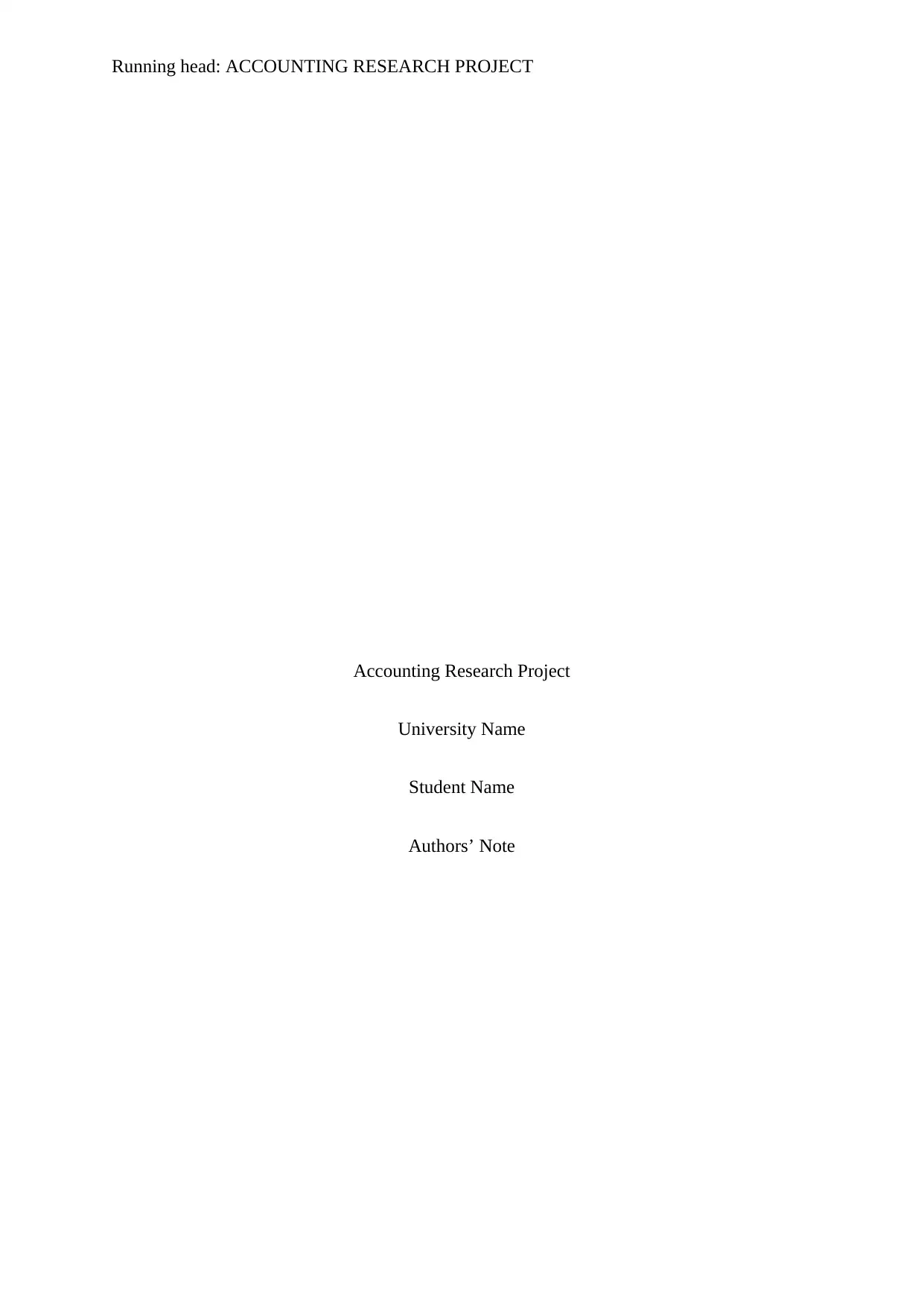
Running head: ACCOUNTING RESEARCH PROJECT
Accounting Research Project
University Name
Student Name
Authors’ Note
Accounting Research Project
University Name
Student Name
Authors’ Note
Paraphrase This Document
Need a fresh take? Get an instant paraphrase of this document with our AI Paraphraser
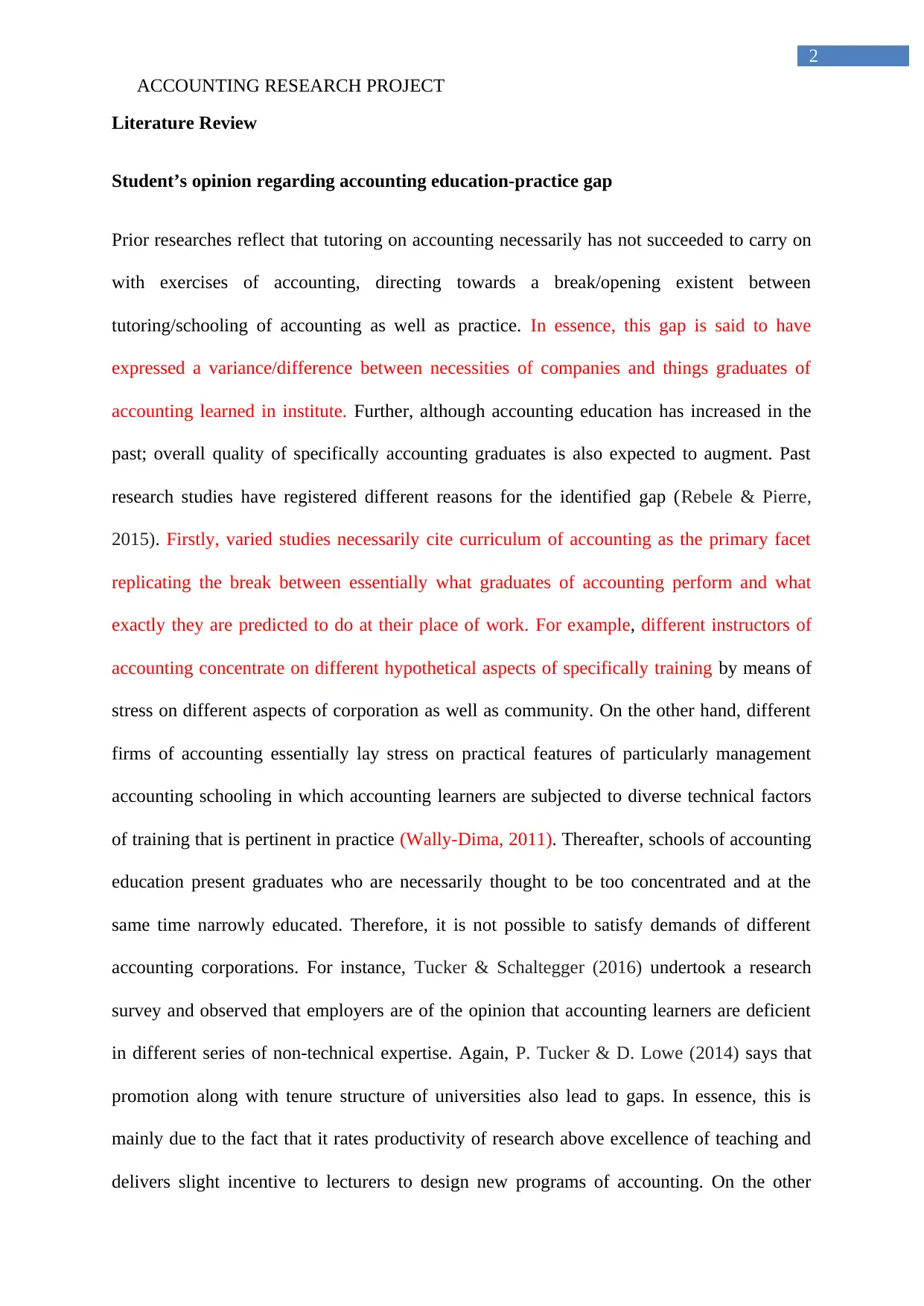
2
ACCOUNTING RESEARCH PROJECT
Literature Review
Student’s opinion regarding accounting education-practice gap
Prior researches reflect that tutoring on accounting necessarily has not succeeded to carry on
with exercises of accounting, directing towards a break/opening existent between
tutoring/schooling of accounting as well as practice. In essence, this gap is said to have
expressed a variance/difference between necessities of companies and things graduates of
accounting learned in institute. Further, although accounting education has increased in the
past; overall quality of specifically accounting graduates is also expected to augment. Past
research studies have registered different reasons for the identified gap (Rebele & Pierre,
2015). Firstly, varied studies necessarily cite curriculum of accounting as the primary facet
replicating the break between essentially what graduates of accounting perform and what
exactly they are predicted to do at their place of work. For example, different instructors of
accounting concentrate on different hypothetical aspects of specifically training by means of
stress on different aspects of corporation as well as community. On the other hand, different
firms of accounting essentially lay stress on practical features of particularly management
accounting schooling in which accounting learners are subjected to diverse technical factors
of training that is pertinent in practice (Wally-Dima, 2011). Thereafter, schools of accounting
education present graduates who are necessarily thought to be too concentrated and at the
same time narrowly educated. Therefore, it is not possible to satisfy demands of different
accounting corporations. For instance, Tucker & Schaltegger (2016) undertook a research
survey and observed that employers are of the opinion that accounting learners are deficient
in different series of non-technical expertise. Again, P. Tucker & D. Lowe (2014) says that
promotion along with tenure structure of universities also lead to gaps. In essence, this is
mainly due to the fact that it rates productivity of research above excellence of teaching and
delivers slight incentive to lecturers to design new programs of accounting. On the other
ACCOUNTING RESEARCH PROJECT
Literature Review
Student’s opinion regarding accounting education-practice gap
Prior researches reflect that tutoring on accounting necessarily has not succeeded to carry on
with exercises of accounting, directing towards a break/opening existent between
tutoring/schooling of accounting as well as practice. In essence, this gap is said to have
expressed a variance/difference between necessities of companies and things graduates of
accounting learned in institute. Further, although accounting education has increased in the
past; overall quality of specifically accounting graduates is also expected to augment. Past
research studies have registered different reasons for the identified gap (Rebele & Pierre,
2015). Firstly, varied studies necessarily cite curriculum of accounting as the primary facet
replicating the break between essentially what graduates of accounting perform and what
exactly they are predicted to do at their place of work. For example, different instructors of
accounting concentrate on different hypothetical aspects of specifically training by means of
stress on different aspects of corporation as well as community. On the other hand, different
firms of accounting essentially lay stress on practical features of particularly management
accounting schooling in which accounting learners are subjected to diverse technical factors
of training that is pertinent in practice (Wally-Dima, 2011). Thereafter, schools of accounting
education present graduates who are necessarily thought to be too concentrated and at the
same time narrowly educated. Therefore, it is not possible to satisfy demands of different
accounting corporations. For instance, Tucker & Schaltegger (2016) undertook a research
survey and observed that employers are of the opinion that accounting learners are deficient
in different series of non-technical expertise. Again, P. Tucker & D. Lowe (2014) says that
promotion along with tenure structure of universities also lead to gaps. In essence, this is
mainly due to the fact that it rates productivity of research above excellence of teaching and
delivers slight incentive to lecturers to design new programs of accounting. On the other
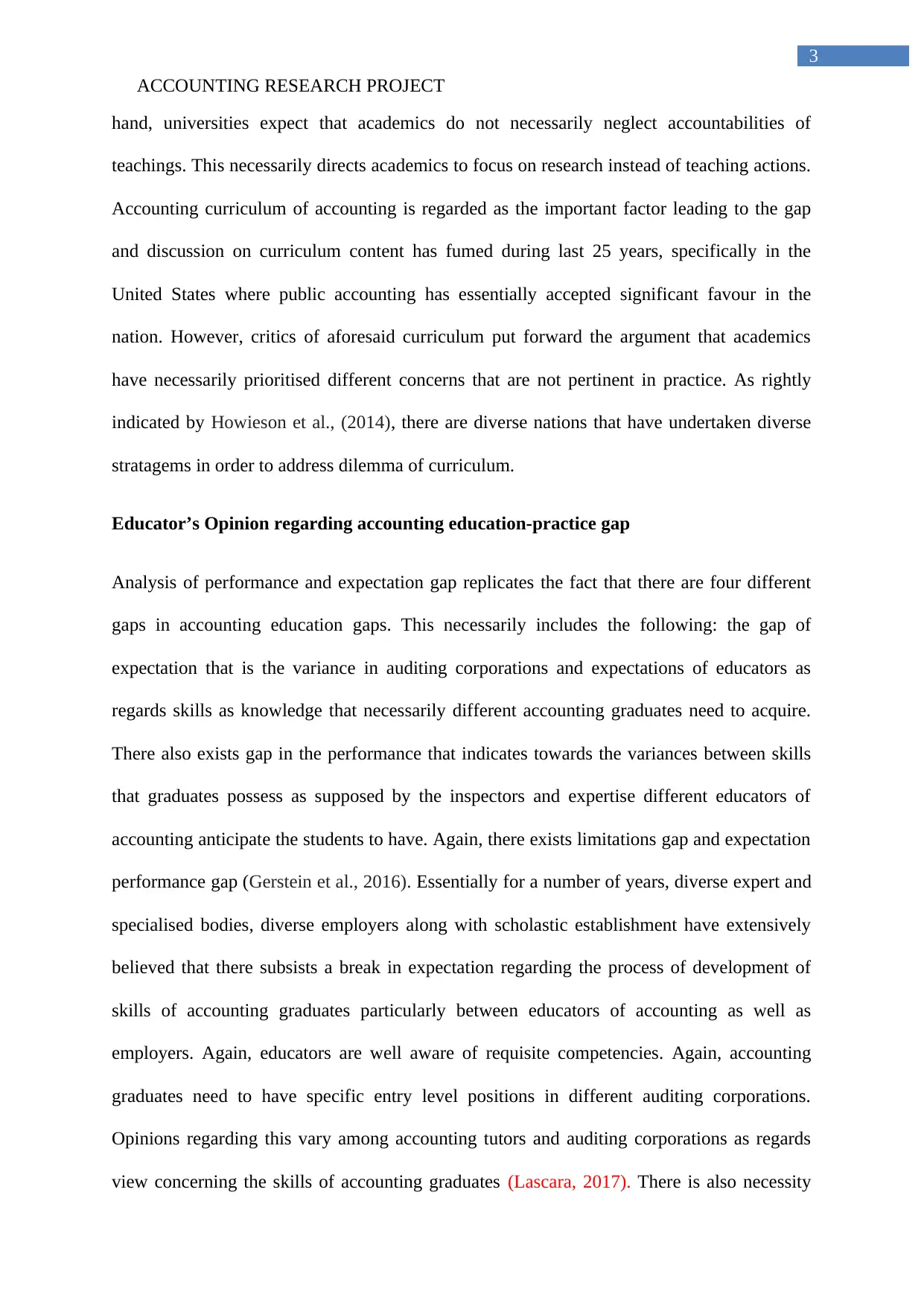
3
ACCOUNTING RESEARCH PROJECT
hand, universities expect that academics do not necessarily neglect accountabilities of
teachings. This necessarily directs academics to focus on research instead of teaching actions.
Accounting curriculum of accounting is regarded as the important factor leading to the gap
and discussion on curriculum content has fumed during last 25 years, specifically in the
United States where public accounting has essentially accepted significant favour in the
nation. However, critics of aforesaid curriculum put forward the argument that academics
have necessarily prioritised different concerns that are not pertinent in practice. As rightly
indicated by Howieson et al., (2014), there are diverse nations that have undertaken diverse
stratagems in order to address dilemma of curriculum.
Educator’s Opinion regarding accounting education-practice gap
Analysis of performance and expectation gap replicates the fact that there are four different
gaps in accounting education gaps. This necessarily includes the following: the gap of
expectation that is the variance in auditing corporations and expectations of educators as
regards skills as knowledge that necessarily different accounting graduates need to acquire.
There also exists gap in the performance that indicates towards the variances between skills
that graduates possess as supposed by the inspectors and expertise different educators of
accounting anticipate the students to have. Again, there exists limitations gap and expectation
performance gap (Gerstein et al., 2016). Essentially for a number of years, diverse expert and
specialised bodies, diverse employers along with scholastic establishment have extensively
believed that there subsists a break in expectation regarding the process of development of
skills of accounting graduates particularly between educators of accounting as well as
employers. Again, educators are well aware of requisite competencies. Again, accounting
graduates need to have specific entry level positions in different auditing corporations.
Opinions regarding this vary among accounting tutors and auditing corporations as regards
view concerning the skills of accounting graduates (Lascara, 2017). There is also necessity
ACCOUNTING RESEARCH PROJECT
hand, universities expect that academics do not necessarily neglect accountabilities of
teachings. This necessarily directs academics to focus on research instead of teaching actions.
Accounting curriculum of accounting is regarded as the important factor leading to the gap
and discussion on curriculum content has fumed during last 25 years, specifically in the
United States where public accounting has essentially accepted significant favour in the
nation. However, critics of aforesaid curriculum put forward the argument that academics
have necessarily prioritised different concerns that are not pertinent in practice. As rightly
indicated by Howieson et al., (2014), there are diverse nations that have undertaken diverse
stratagems in order to address dilemma of curriculum.
Educator’s Opinion regarding accounting education-practice gap
Analysis of performance and expectation gap replicates the fact that there are four different
gaps in accounting education gaps. This necessarily includes the following: the gap of
expectation that is the variance in auditing corporations and expectations of educators as
regards skills as knowledge that necessarily different accounting graduates need to acquire.
There also exists gap in the performance that indicates towards the variances between skills
that graduates possess as supposed by the inspectors and expertise different educators of
accounting anticipate the students to have. Again, there exists limitations gap and expectation
performance gap (Gerstein et al., 2016). Essentially for a number of years, diverse expert and
specialised bodies, diverse employers along with scholastic establishment have extensively
believed that there subsists a break in expectation regarding the process of development of
skills of accounting graduates particularly between educators of accounting as well as
employers. Again, educators are well aware of requisite competencies. Again, accounting
graduates need to have specific entry level positions in different auditing corporations.
Opinions regarding this vary among accounting tutors and auditing corporations as regards
view concerning the skills of accounting graduates (Lascara, 2017). There is also necessity
⊘ This is a preview!⊘
Do you want full access?
Subscribe today to unlock all pages.

Trusted by 1+ million students worldwide
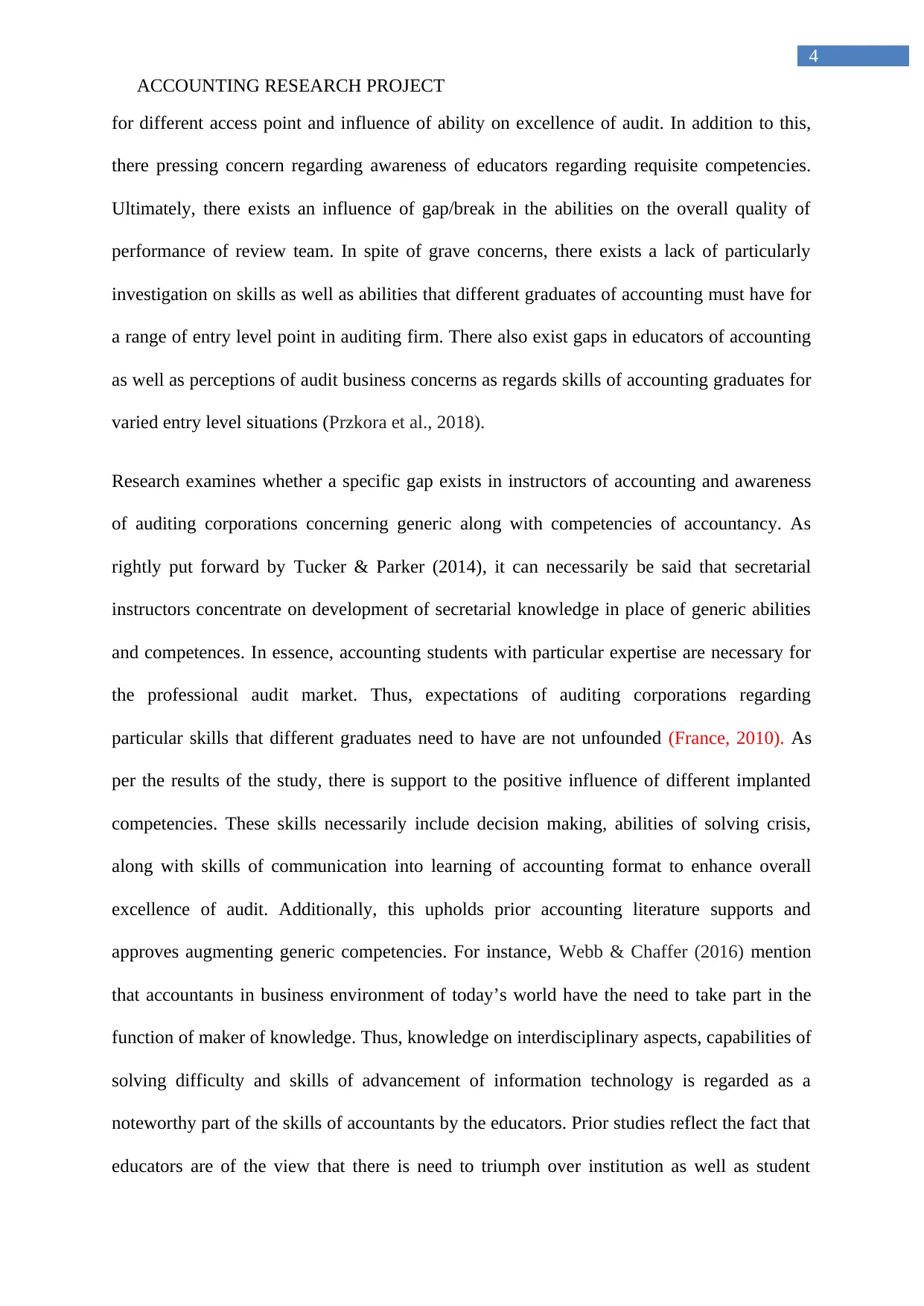
4
ACCOUNTING RESEARCH PROJECT
for different access point and influence of ability on excellence of audit. In addition to this,
there pressing concern regarding awareness of educators regarding requisite competencies.
Ultimately, there exists an influence of gap/break in the abilities on the overall quality of
performance of review team. In spite of grave concerns, there exists a lack of particularly
investigation on skills as well as abilities that different graduates of accounting must have for
a range of entry level point in auditing firm. There also exist gaps in educators of accounting
as well as perceptions of audit business concerns as regards skills of accounting graduates for
varied entry level situations (Przkora et al., 2018).
Research examines whether a specific gap exists in instructors of accounting and awareness
of auditing corporations concerning generic along with competencies of accountancy. As
rightly put forward by Tucker & Parker (2014), it can necessarily be said that secretarial
instructors concentrate on development of secretarial knowledge in place of generic abilities
and competences. In essence, accounting students with particular expertise are necessary for
the professional audit market. Thus, expectations of auditing corporations regarding
particular skills that different graduates need to have are not unfounded (France, 2010). As
per the results of the study, there is support to the positive influence of different implanted
competencies. These skills necessarily include decision making, abilities of solving crisis,
along with skills of communication into learning of accounting format to enhance overall
excellence of audit. Additionally, this upholds prior accounting literature supports and
approves augmenting generic competencies. For instance, Webb & Chaffer (2016) mention
that accountants in business environment of today’s world have the need to take part in the
function of maker of knowledge. Thus, knowledge on interdisciplinary aspects, capabilities of
solving difficulty and skills of advancement of information technology is regarded as a
noteworthy part of the skills of accountants by the educators. Prior studies reflect the fact that
educators are of the view that there is need to triumph over institution as well as student
ACCOUNTING RESEARCH PROJECT
for different access point and influence of ability on excellence of audit. In addition to this,
there pressing concern regarding awareness of educators regarding requisite competencies.
Ultimately, there exists an influence of gap/break in the abilities on the overall quality of
performance of review team. In spite of grave concerns, there exists a lack of particularly
investigation on skills as well as abilities that different graduates of accounting must have for
a range of entry level point in auditing firm. There also exist gaps in educators of accounting
as well as perceptions of audit business concerns as regards skills of accounting graduates for
varied entry level situations (Przkora et al., 2018).
Research examines whether a specific gap exists in instructors of accounting and awareness
of auditing corporations concerning generic along with competencies of accountancy. As
rightly put forward by Tucker & Parker (2014), it can necessarily be said that secretarial
instructors concentrate on development of secretarial knowledge in place of generic abilities
and competences. In essence, accounting students with particular expertise are necessary for
the professional audit market. Thus, expectations of auditing corporations regarding
particular skills that different graduates need to have are not unfounded (France, 2010). As
per the results of the study, there is support to the positive influence of different implanted
competencies. These skills necessarily include decision making, abilities of solving crisis,
along with skills of communication into learning of accounting format to enhance overall
excellence of audit. Additionally, this upholds prior accounting literature supports and
approves augmenting generic competencies. For instance, Webb & Chaffer (2016) mention
that accountants in business environment of today’s world have the need to take part in the
function of maker of knowledge. Thus, knowledge on interdisciplinary aspects, capabilities of
solving difficulty and skills of advancement of information technology is regarded as a
noteworthy part of the skills of accountants by the educators. Prior studies reflect the fact that
educators are of the view that there is need to triumph over institution as well as student
Paraphrase This Document
Need a fresh take? Get an instant paraphrase of this document with our AI Paraphraser
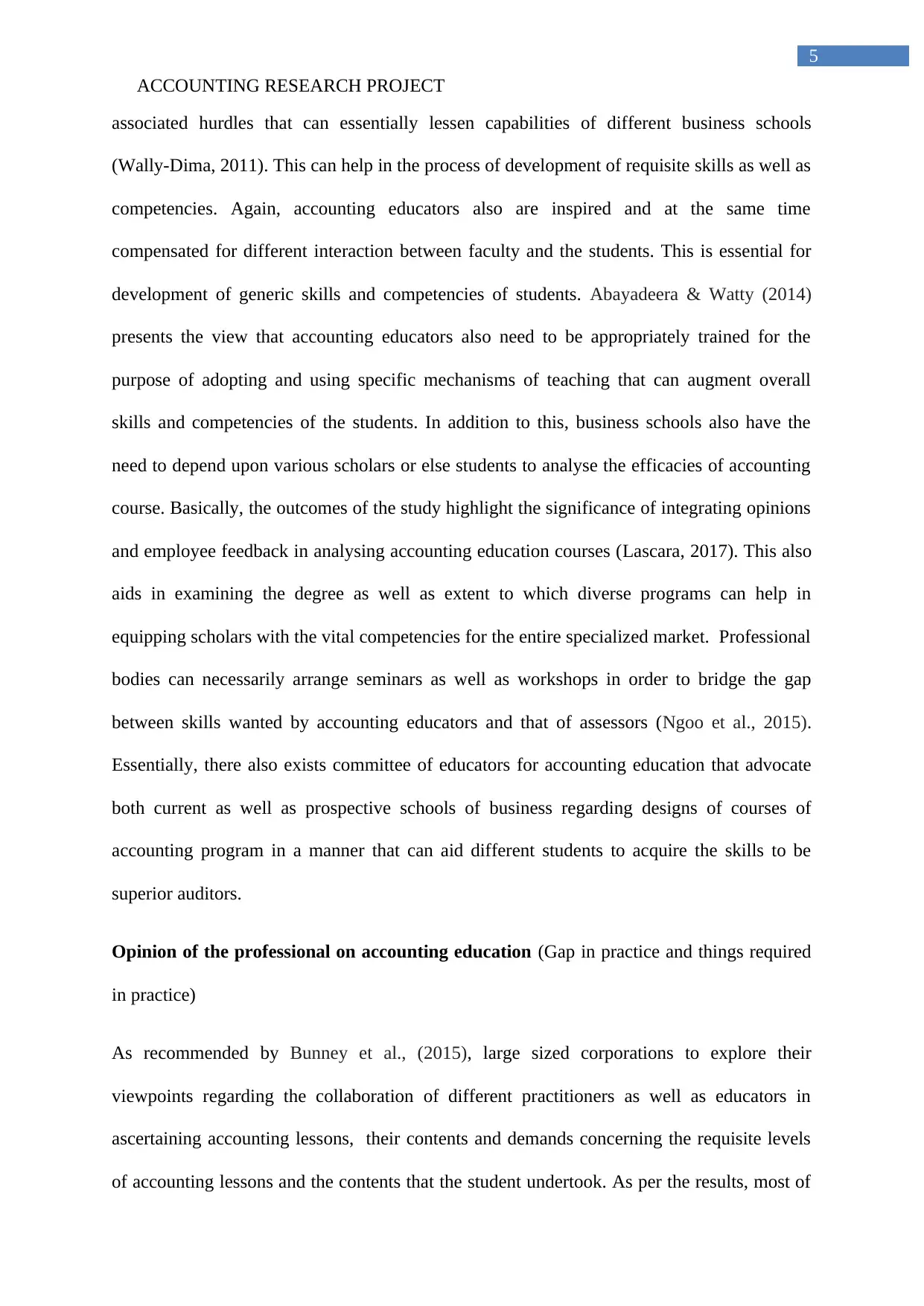
5
ACCOUNTING RESEARCH PROJECT
associated hurdles that can essentially lessen capabilities of different business schools
(Wally-Dima, 2011). This can help in the process of development of requisite skills as well as
competencies. Again, accounting educators also are inspired and at the same time
compensated for different interaction between faculty and the students. This is essential for
development of generic skills and competencies of students. Abayadeera & Watty (2014)
presents the view that accounting educators also need to be appropriately trained for the
purpose of adopting and using specific mechanisms of teaching that can augment overall
skills and competencies of the students. In addition to this, business schools also have the
need to depend upon various scholars or else students to analyse the efficacies of accounting
course. Basically, the outcomes of the study highlight the significance of integrating opinions
and employee feedback in analysing accounting education courses (Lascara, 2017). This also
aids in examining the degree as well as extent to which diverse programs can help in
equipping scholars with the vital competencies for the entire specialized market. Professional
bodies can necessarily arrange seminars as well as workshops in order to bridge the gap
between skills wanted by accounting educators and that of assessors (Ngoo et al., 2015).
Essentially, there also exists committee of educators for accounting education that advocate
both current as well as prospective schools of business regarding designs of courses of
accounting program in a manner that can aid different students to acquire the skills to be
superior auditors.
Opinion of the professional on accounting education (Gap in practice and things required
in practice)
As recommended by Bunney et al., (2015), large sized corporations to explore their
viewpoints regarding the collaboration of different practitioners as well as educators in
ascertaining accounting lessons, their contents and demands concerning the requisite levels
of accounting lessons and the contents that the student undertook. As per the results, most of
ACCOUNTING RESEARCH PROJECT
associated hurdles that can essentially lessen capabilities of different business schools
(Wally-Dima, 2011). This can help in the process of development of requisite skills as well as
competencies. Again, accounting educators also are inspired and at the same time
compensated for different interaction between faculty and the students. This is essential for
development of generic skills and competencies of students. Abayadeera & Watty (2014)
presents the view that accounting educators also need to be appropriately trained for the
purpose of adopting and using specific mechanisms of teaching that can augment overall
skills and competencies of the students. In addition to this, business schools also have the
need to depend upon various scholars or else students to analyse the efficacies of accounting
course. Basically, the outcomes of the study highlight the significance of integrating opinions
and employee feedback in analysing accounting education courses (Lascara, 2017). This also
aids in examining the degree as well as extent to which diverse programs can help in
equipping scholars with the vital competencies for the entire specialized market. Professional
bodies can necessarily arrange seminars as well as workshops in order to bridge the gap
between skills wanted by accounting educators and that of assessors (Ngoo et al., 2015).
Essentially, there also exists committee of educators for accounting education that advocate
both current as well as prospective schools of business regarding designs of courses of
accounting program in a manner that can aid different students to acquire the skills to be
superior auditors.
Opinion of the professional on accounting education (Gap in practice and things required
in practice)
As recommended by Bunney et al., (2015), large sized corporations to explore their
viewpoints regarding the collaboration of different practitioners as well as educators in
ascertaining accounting lessons, their contents and demands concerning the requisite levels
of accounting lessons and the contents that the student undertook. As per the results, most of
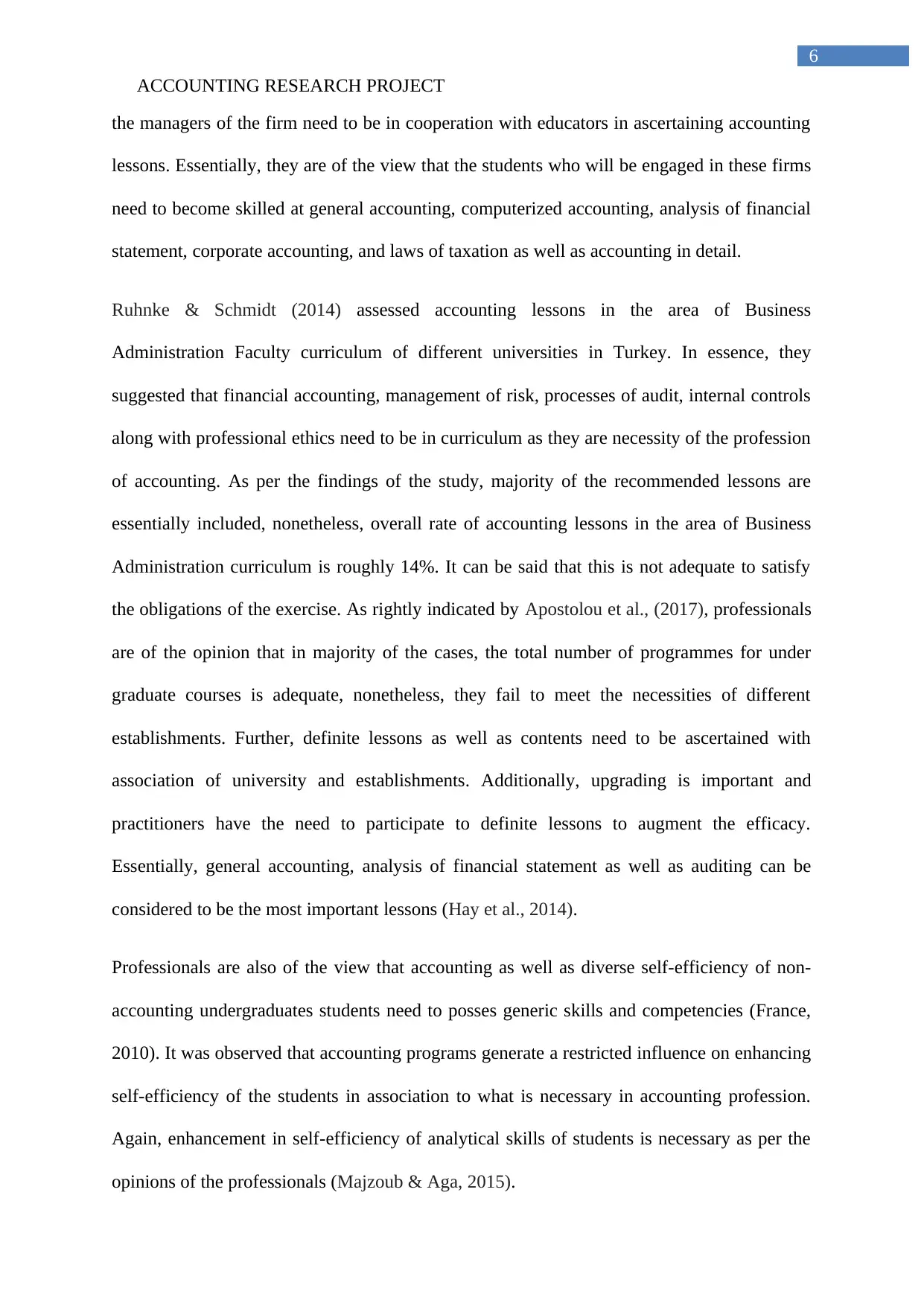
6
ACCOUNTING RESEARCH PROJECT
the managers of the firm need to be in cooperation with educators in ascertaining accounting
lessons. Essentially, they are of the view that the students who will be engaged in these firms
need to become skilled at general accounting, computerized accounting, analysis of financial
statement, corporate accounting, and laws of taxation as well as accounting in detail.
Ruhnke & Schmidt (2014) assessed accounting lessons in the area of Business
Administration Faculty curriculum of different universities in Turkey. In essence, they
suggested that financial accounting, management of risk, processes of audit, internal controls
along with professional ethics need to be in curriculum as they are necessity of the profession
of accounting. As per the findings of the study, majority of the recommended lessons are
essentially included, nonetheless, overall rate of accounting lessons in the area of Business
Administration curriculum is roughly 14%. It can be said that this is not adequate to satisfy
the obligations of the exercise. As rightly indicated by Apostolou et al., (2017), professionals
are of the opinion that in majority of the cases, the total number of programmes for under
graduate courses is adequate, nonetheless, they fail to meet the necessities of different
establishments. Further, definite lessons as well as contents need to be ascertained with
association of university and establishments. Additionally, upgrading is important and
practitioners have the need to participate to definite lessons to augment the efficacy.
Essentially, general accounting, analysis of financial statement as well as auditing can be
considered to be the most important lessons (Hay et al., 2014).
Professionals are also of the view that accounting as well as diverse self-efficiency of non-
accounting undergraduates students need to posses generic skills and competencies (France,
2010). It was observed that accounting programs generate a restricted influence on enhancing
self-efficiency of the students in association to what is necessary in accounting profession.
Again, enhancement in self-efficiency of analytical skills of students is necessary as per the
opinions of the professionals (Majzoub & Aga, 2015).
ACCOUNTING RESEARCH PROJECT
the managers of the firm need to be in cooperation with educators in ascertaining accounting
lessons. Essentially, they are of the view that the students who will be engaged in these firms
need to become skilled at general accounting, computerized accounting, analysis of financial
statement, corporate accounting, and laws of taxation as well as accounting in detail.
Ruhnke & Schmidt (2014) assessed accounting lessons in the area of Business
Administration Faculty curriculum of different universities in Turkey. In essence, they
suggested that financial accounting, management of risk, processes of audit, internal controls
along with professional ethics need to be in curriculum as they are necessity of the profession
of accounting. As per the findings of the study, majority of the recommended lessons are
essentially included, nonetheless, overall rate of accounting lessons in the area of Business
Administration curriculum is roughly 14%. It can be said that this is not adequate to satisfy
the obligations of the exercise. As rightly indicated by Apostolou et al., (2017), professionals
are of the opinion that in majority of the cases, the total number of programmes for under
graduate courses is adequate, nonetheless, they fail to meet the necessities of different
establishments. Further, definite lessons as well as contents need to be ascertained with
association of university and establishments. Additionally, upgrading is important and
practitioners have the need to participate to definite lessons to augment the efficacy.
Essentially, general accounting, analysis of financial statement as well as auditing can be
considered to be the most important lessons (Hay et al., 2014).
Professionals are also of the view that accounting as well as diverse self-efficiency of non-
accounting undergraduates students need to posses generic skills and competencies (France,
2010). It was observed that accounting programs generate a restricted influence on enhancing
self-efficiency of the students in association to what is necessary in accounting profession.
Again, enhancement in self-efficiency of analytical skills of students is necessary as per the
opinions of the professionals (Majzoub & Aga, 2015).
⊘ This is a preview!⊘
Do you want full access?
Subscribe today to unlock all pages.

Trusted by 1+ million students worldwide
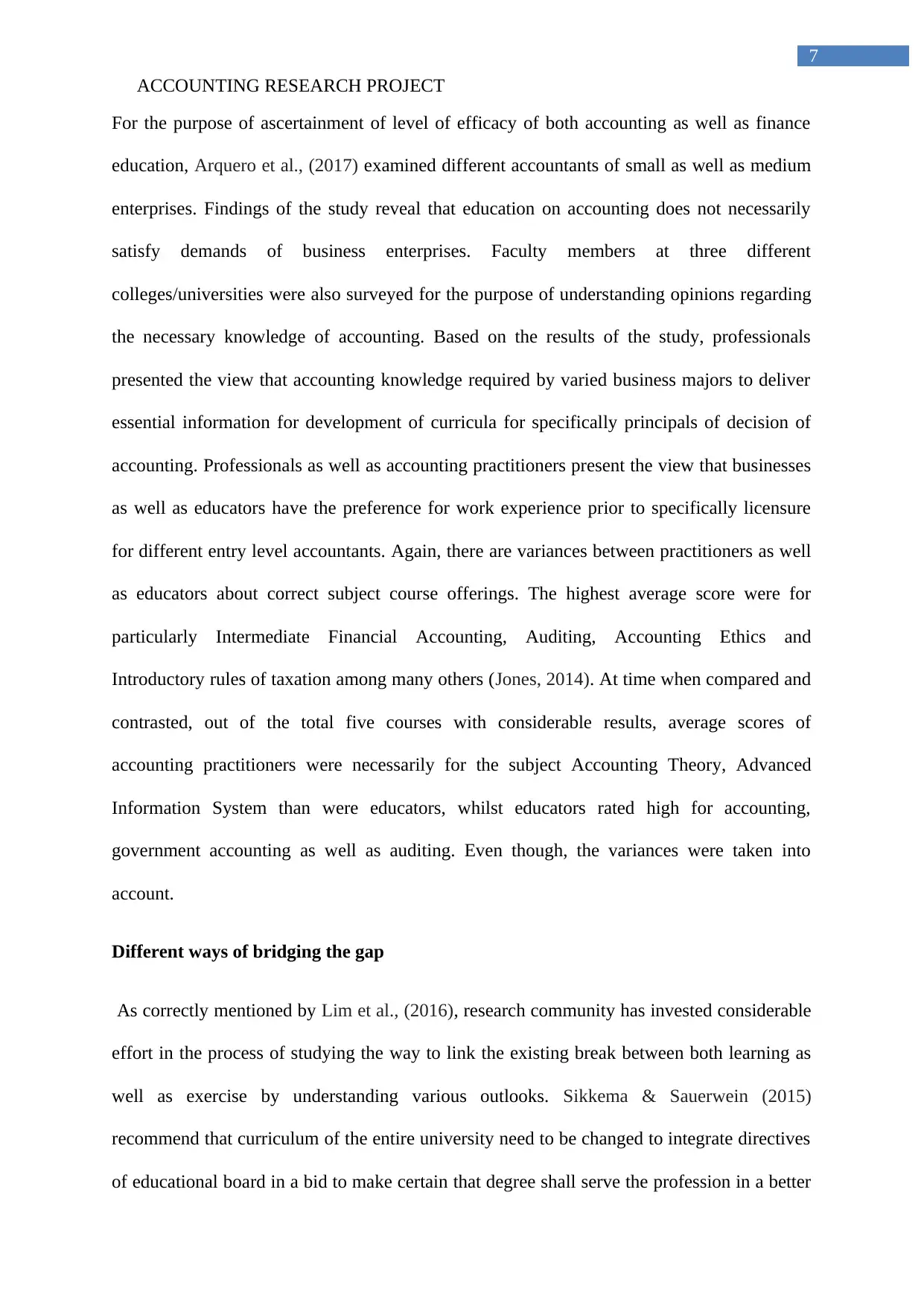
7
ACCOUNTING RESEARCH PROJECT
For the purpose of ascertainment of level of efficacy of both accounting as well as finance
education, Arquero et al., (2017) examined different accountants of small as well as medium
enterprises. Findings of the study reveal that education on accounting does not necessarily
satisfy demands of business enterprises. Faculty members at three different
colleges/universities were also surveyed for the purpose of understanding opinions regarding
the necessary knowledge of accounting. Based on the results of the study, professionals
presented the view that accounting knowledge required by varied business majors to deliver
essential information for development of curricula for specifically principals of decision of
accounting. Professionals as well as accounting practitioners present the view that businesses
as well as educators have the preference for work experience prior to specifically licensure
for different entry level accountants. Again, there are variances between practitioners as well
as educators about correct subject course offerings. The highest average score were for
particularly Intermediate Financial Accounting, Auditing, Accounting Ethics and
Introductory rules of taxation among many others (Jones, 2014). At time when compared and
contrasted, out of the total five courses with considerable results, average scores of
accounting practitioners were necessarily for the subject Accounting Theory, Advanced
Information System than were educators, whilst educators rated high for accounting,
government accounting as well as auditing. Even though, the variances were taken into
account.
Different ways of bridging the gap
As correctly mentioned by Lim et al., (2016), research community has invested considerable
effort in the process of studying the way to link the existing break between both learning as
well as exercise by understanding various outlooks. Sikkema & Sauerwein (2015)
recommend that curriculum of the entire university need to be changed to integrate directives
of educational board in a bid to make certain that degree shall serve the profession in a better
ACCOUNTING RESEARCH PROJECT
For the purpose of ascertainment of level of efficacy of both accounting as well as finance
education, Arquero et al., (2017) examined different accountants of small as well as medium
enterprises. Findings of the study reveal that education on accounting does not necessarily
satisfy demands of business enterprises. Faculty members at three different
colleges/universities were also surveyed for the purpose of understanding opinions regarding
the necessary knowledge of accounting. Based on the results of the study, professionals
presented the view that accounting knowledge required by varied business majors to deliver
essential information for development of curricula for specifically principals of decision of
accounting. Professionals as well as accounting practitioners present the view that businesses
as well as educators have the preference for work experience prior to specifically licensure
for different entry level accountants. Again, there are variances between practitioners as well
as educators about correct subject course offerings. The highest average score were for
particularly Intermediate Financial Accounting, Auditing, Accounting Ethics and
Introductory rules of taxation among many others (Jones, 2014). At time when compared and
contrasted, out of the total five courses with considerable results, average scores of
accounting practitioners were necessarily for the subject Accounting Theory, Advanced
Information System than were educators, whilst educators rated high for accounting,
government accounting as well as auditing. Even though, the variances were taken into
account.
Different ways of bridging the gap
As correctly mentioned by Lim et al., (2016), research community has invested considerable
effort in the process of studying the way to link the existing break between both learning as
well as exercise by understanding various outlooks. Sikkema & Sauerwein (2015)
recommend that curriculum of the entire university need to be changed to integrate directives
of educational board in a bid to make certain that degree shall serve the profession in a better
Paraphrase This Document
Need a fresh take? Get an instant paraphrase of this document with our AI Paraphraser
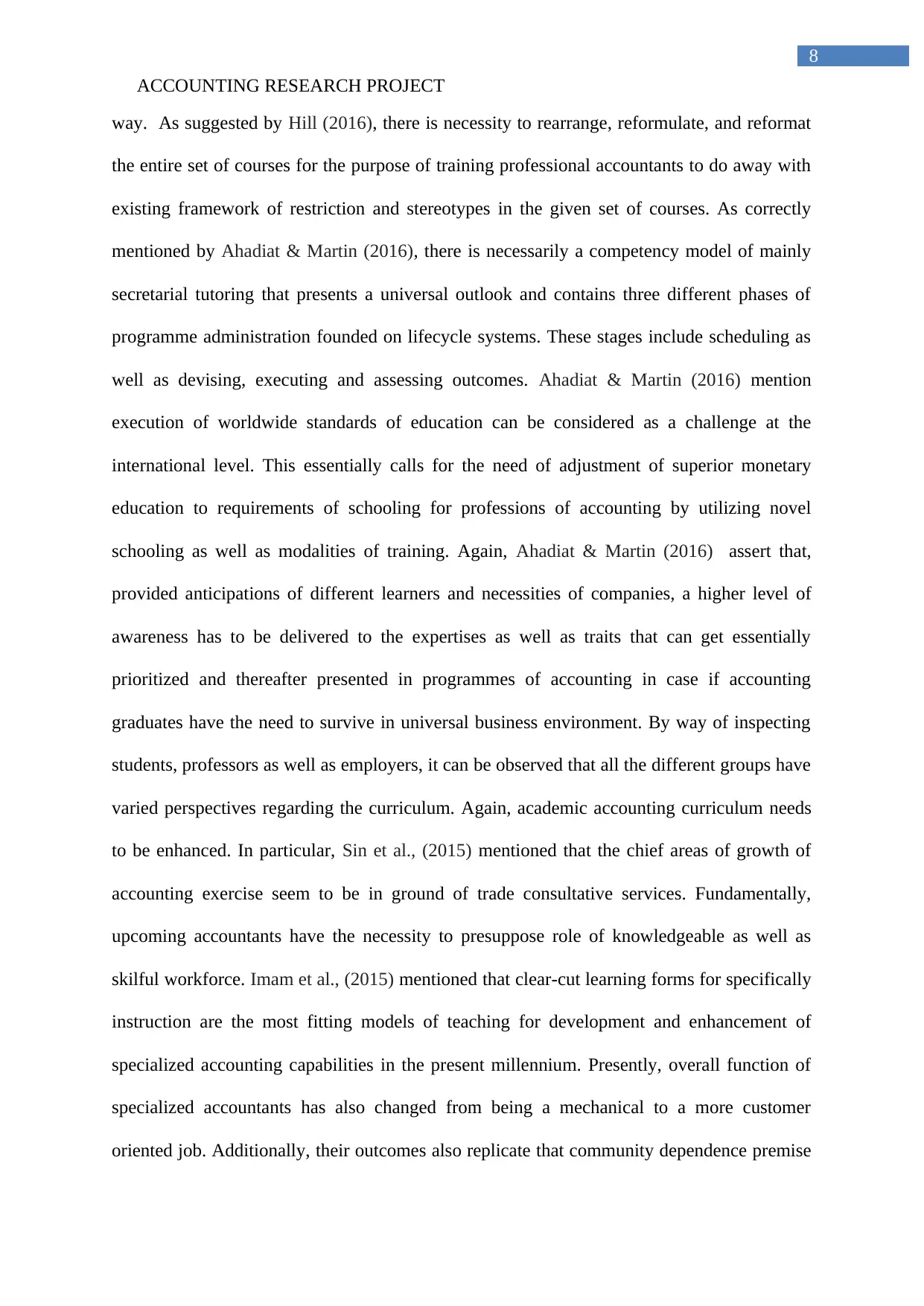
8
ACCOUNTING RESEARCH PROJECT
way. As suggested by Hill (2016), there is necessity to rearrange, reformulate, and reformat
the entire set of courses for the purpose of training professional accountants to do away with
existing framework of restriction and stereotypes in the given set of courses. As correctly
mentioned by Ahadiat & Martin (2016), there is necessarily a competency model of mainly
secretarial tutoring that presents a universal outlook and contains three different phases of
programme administration founded on lifecycle systems. These stages include scheduling as
well as devising, executing and assessing outcomes. Ahadiat & Martin (2016) mention
execution of worldwide standards of education can be considered as a challenge at the
international level. This essentially calls for the need of adjustment of superior monetary
education to requirements of schooling for professions of accounting by utilizing novel
schooling as well as modalities of training. Again, Ahadiat & Martin (2016) assert that,
provided anticipations of different learners and necessities of companies, a higher level of
awareness has to be delivered to the expertises as well as traits that can get essentially
prioritized and thereafter presented in programmes of accounting in case if accounting
graduates have the need to survive in universal business environment. By way of inspecting
students, professors as well as employers, it can be observed that all the different groups have
varied perspectives regarding the curriculum. Again, academic accounting curriculum needs
to be enhanced. In particular, Sin et al., (2015) mentioned that the chief areas of growth of
accounting exercise seem to be in ground of trade consultative services. Fundamentally,
upcoming accountants have the necessity to presuppose role of knowledgeable as well as
skilful workforce. Imam et al., (2015) mentioned that clear-cut learning forms for specifically
instruction are the most fitting models of teaching for development and enhancement of
specialized accounting capabilities in the present millennium. Presently, overall function of
specialized accountants has also changed from being a mechanical to a more customer
oriented job. Additionally, their outcomes also replicate that community dependence premise
ACCOUNTING RESEARCH PROJECT
way. As suggested by Hill (2016), there is necessity to rearrange, reformulate, and reformat
the entire set of courses for the purpose of training professional accountants to do away with
existing framework of restriction and stereotypes in the given set of courses. As correctly
mentioned by Ahadiat & Martin (2016), there is necessarily a competency model of mainly
secretarial tutoring that presents a universal outlook and contains three different phases of
programme administration founded on lifecycle systems. These stages include scheduling as
well as devising, executing and assessing outcomes. Ahadiat & Martin (2016) mention
execution of worldwide standards of education can be considered as a challenge at the
international level. This essentially calls for the need of adjustment of superior monetary
education to requirements of schooling for professions of accounting by utilizing novel
schooling as well as modalities of training. Again, Ahadiat & Martin (2016) assert that,
provided anticipations of different learners and necessities of companies, a higher level of
awareness has to be delivered to the expertises as well as traits that can get essentially
prioritized and thereafter presented in programmes of accounting in case if accounting
graduates have the need to survive in universal business environment. By way of inspecting
students, professors as well as employers, it can be observed that all the different groups have
varied perspectives regarding the curriculum. Again, academic accounting curriculum needs
to be enhanced. In particular, Sin et al., (2015) mentioned that the chief areas of growth of
accounting exercise seem to be in ground of trade consultative services. Fundamentally,
upcoming accountants have the necessity to presuppose role of knowledgeable as well as
skilful workforce. Imam et al., (2015) mentioned that clear-cut learning forms for specifically
instruction are the most fitting models of teaching for development and enhancement of
specialized accounting capabilities in the present millennium. Presently, overall function of
specialized accountants has also changed from being a mechanical to a more customer
oriented job. Additionally, their outcomes also replicate that community dependence premise
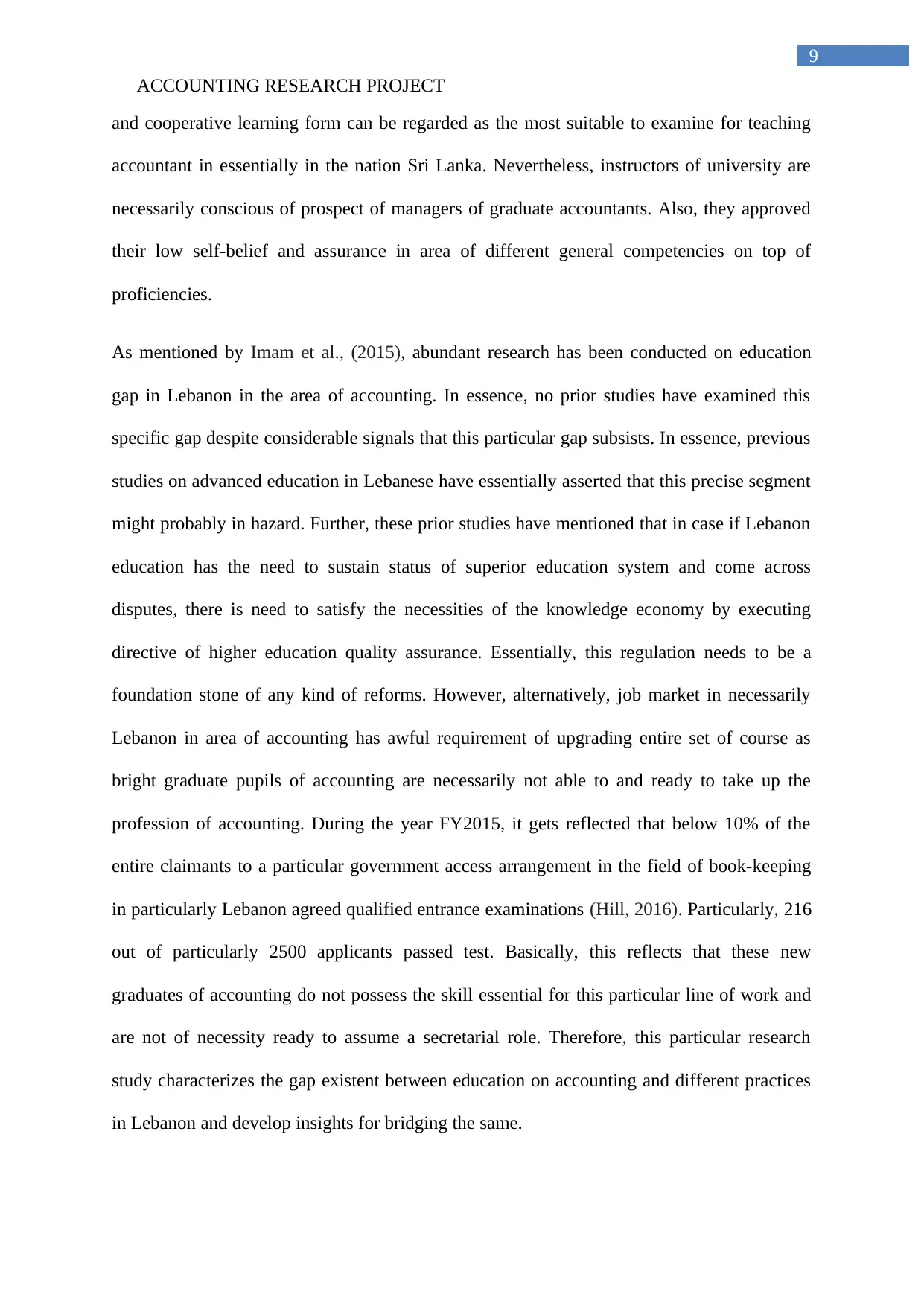
9
ACCOUNTING RESEARCH PROJECT
and cooperative learning form can be regarded as the most suitable to examine for teaching
accountant in essentially in the nation Sri Lanka. Nevertheless, instructors of university are
necessarily conscious of prospect of managers of graduate accountants. Also, they approved
their low self-belief and assurance in area of different general competencies on top of
proficiencies.
As mentioned by Imam et al., (2015), abundant research has been conducted on education
gap in Lebanon in the area of accounting. In essence, no prior studies have examined this
specific gap despite considerable signals that this particular gap subsists. In essence, previous
studies on advanced education in Lebanese have essentially asserted that this precise segment
might probably in hazard. Further, these prior studies have mentioned that in case if Lebanon
education has the need to sustain status of superior education system and come across
disputes, there is need to satisfy the necessities of the knowledge economy by executing
directive of higher education quality assurance. Essentially, this regulation needs to be a
foundation stone of any kind of reforms. However, alternatively, job market in necessarily
Lebanon in area of accounting has awful requirement of upgrading entire set of course as
bright graduate pupils of accounting are necessarily not able to and ready to take up the
profession of accounting. During the year FY2015, it gets reflected that below 10% of the
entire claimants to a particular government access arrangement in the field of book-keeping
in particularly Lebanon agreed qualified entrance examinations (Hill, 2016). Particularly, 216
out of particularly 2500 applicants passed test. Basically, this reflects that these new
graduates of accounting do not possess the skill essential for this particular line of work and
are not of necessity ready to assume a secretarial role. Therefore, this particular research
study characterizes the gap existent between education on accounting and different practices
in Lebanon and develop insights for bridging the same.
ACCOUNTING RESEARCH PROJECT
and cooperative learning form can be regarded as the most suitable to examine for teaching
accountant in essentially in the nation Sri Lanka. Nevertheless, instructors of university are
necessarily conscious of prospect of managers of graduate accountants. Also, they approved
their low self-belief and assurance in area of different general competencies on top of
proficiencies.
As mentioned by Imam et al., (2015), abundant research has been conducted on education
gap in Lebanon in the area of accounting. In essence, no prior studies have examined this
specific gap despite considerable signals that this particular gap subsists. In essence, previous
studies on advanced education in Lebanese have essentially asserted that this precise segment
might probably in hazard. Further, these prior studies have mentioned that in case if Lebanon
education has the need to sustain status of superior education system and come across
disputes, there is need to satisfy the necessities of the knowledge economy by executing
directive of higher education quality assurance. Essentially, this regulation needs to be a
foundation stone of any kind of reforms. However, alternatively, job market in necessarily
Lebanon in area of accounting has awful requirement of upgrading entire set of course as
bright graduate pupils of accounting are necessarily not able to and ready to take up the
profession of accounting. During the year FY2015, it gets reflected that below 10% of the
entire claimants to a particular government access arrangement in the field of book-keeping
in particularly Lebanon agreed qualified entrance examinations (Hill, 2016). Particularly, 216
out of particularly 2500 applicants passed test. Basically, this reflects that these new
graduates of accounting do not possess the skill essential for this particular line of work and
are not of necessity ready to assume a secretarial role. Therefore, this particular research
study characterizes the gap existent between education on accounting and different practices
in Lebanon and develop insights for bridging the same.
⊘ This is a preview!⊘
Do you want full access?
Subscribe today to unlock all pages.

Trusted by 1+ million students worldwide
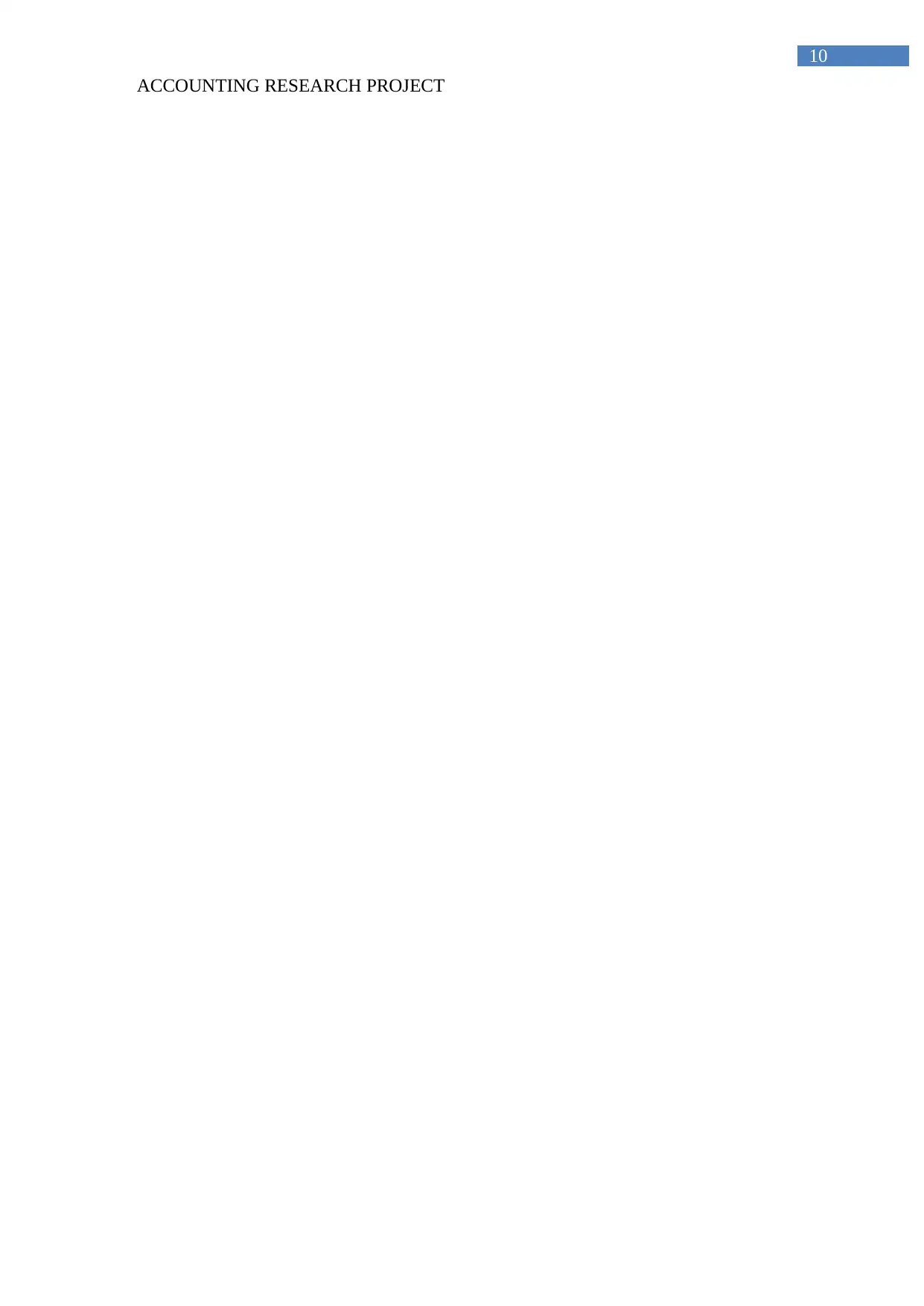
10
ACCOUNTING RESEARCH PROJECT
ACCOUNTING RESEARCH PROJECT
Paraphrase This Document
Need a fresh take? Get an instant paraphrase of this document with our AI Paraphraser
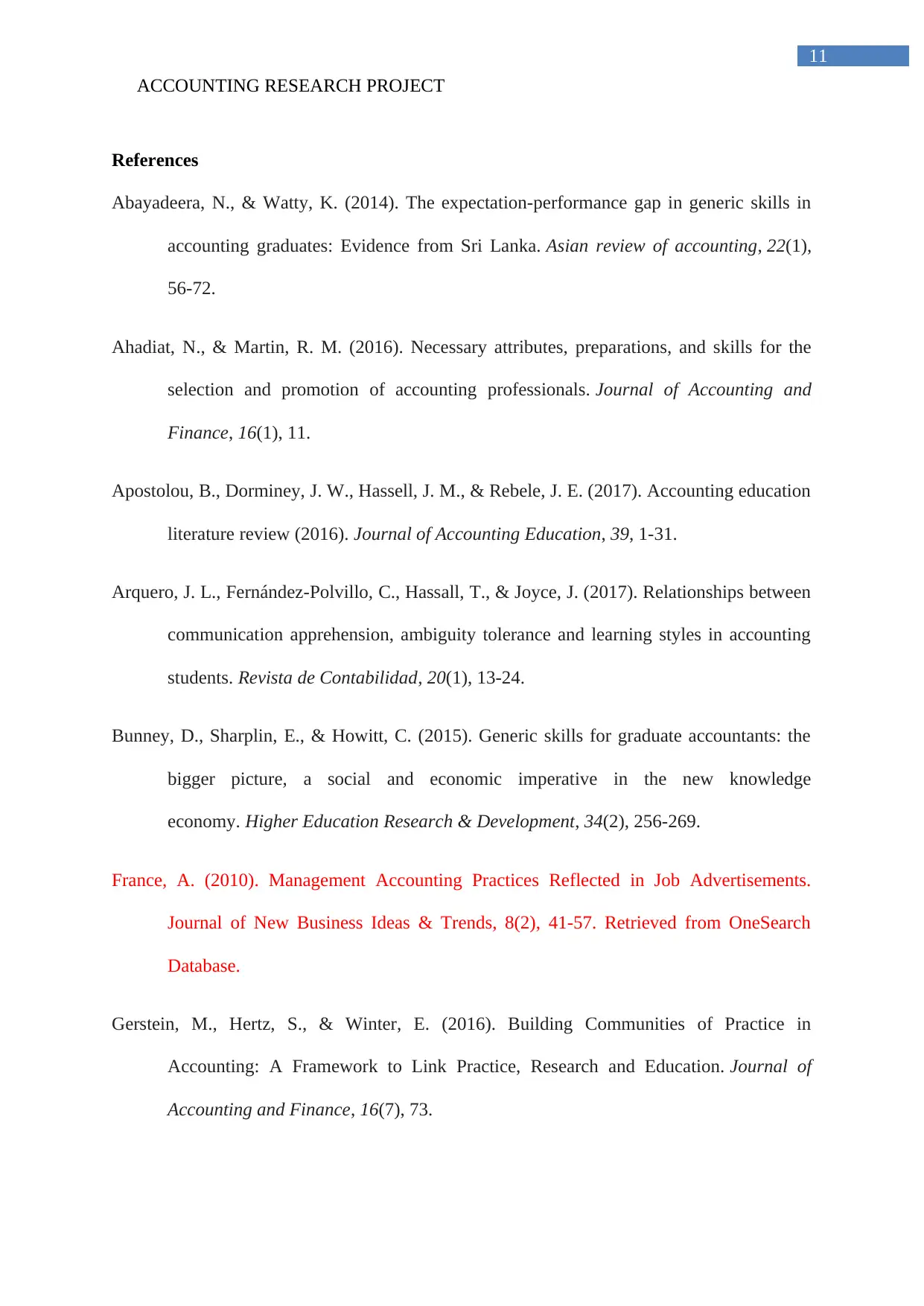
11
ACCOUNTING RESEARCH PROJECT
References
Abayadeera, N., & Watty, K. (2014). The expectation-performance gap in generic skills in
accounting graduates: Evidence from Sri Lanka. Asian review of accounting, 22(1),
56-72.
Ahadiat, N., & Martin, R. M. (2016). Necessary attributes, preparations, and skills for the
selection and promotion of accounting professionals. Journal of Accounting and
Finance, 16(1), 11.
Apostolou, B., Dorminey, J. W., Hassell, J. M., & Rebele, J. E. (2017). Accounting education
literature review (2016). Journal of Accounting Education, 39, 1-31.
Arquero, J. L., Fernández-Polvillo, C., Hassall, T., & Joyce, J. (2017). Relationships between
communication apprehension, ambiguity tolerance and learning styles in accounting
students. Revista de Contabilidad, 20(1), 13-24.
Bunney, D., Sharplin, E., & Howitt, C. (2015). Generic skills for graduate accountants: the
bigger picture, a social and economic imperative in the new knowledge
economy. Higher Education Research & Development, 34(2), 256-269.
France, A. (2010). Management Accounting Practices Reflected in Job Advertisements.
Journal of New Business Ideas & Trends, 8(2), 41-57. Retrieved from OneSearch
Database.
Gerstein, M., Hertz, S., & Winter, E. (2016). Building Communities of Practice in
Accounting: A Framework to Link Practice, Research and Education. Journal of
Accounting and Finance, 16(7), 73.
ACCOUNTING RESEARCH PROJECT
References
Abayadeera, N., & Watty, K. (2014). The expectation-performance gap in generic skills in
accounting graduates: Evidence from Sri Lanka. Asian review of accounting, 22(1),
56-72.
Ahadiat, N., & Martin, R. M. (2016). Necessary attributes, preparations, and skills for the
selection and promotion of accounting professionals. Journal of Accounting and
Finance, 16(1), 11.
Apostolou, B., Dorminey, J. W., Hassell, J. M., & Rebele, J. E. (2017). Accounting education
literature review (2016). Journal of Accounting Education, 39, 1-31.
Arquero, J. L., Fernández-Polvillo, C., Hassall, T., & Joyce, J. (2017). Relationships between
communication apprehension, ambiguity tolerance and learning styles in accounting
students. Revista de Contabilidad, 20(1), 13-24.
Bunney, D., Sharplin, E., & Howitt, C. (2015). Generic skills for graduate accountants: the
bigger picture, a social and economic imperative in the new knowledge
economy. Higher Education Research & Development, 34(2), 256-269.
France, A. (2010). Management Accounting Practices Reflected in Job Advertisements.
Journal of New Business Ideas & Trends, 8(2), 41-57. Retrieved from OneSearch
Database.
Gerstein, M., Hertz, S., & Winter, E. (2016). Building Communities of Practice in
Accounting: A Framework to Link Practice, Research and Education. Journal of
Accounting and Finance, 16(7), 73.
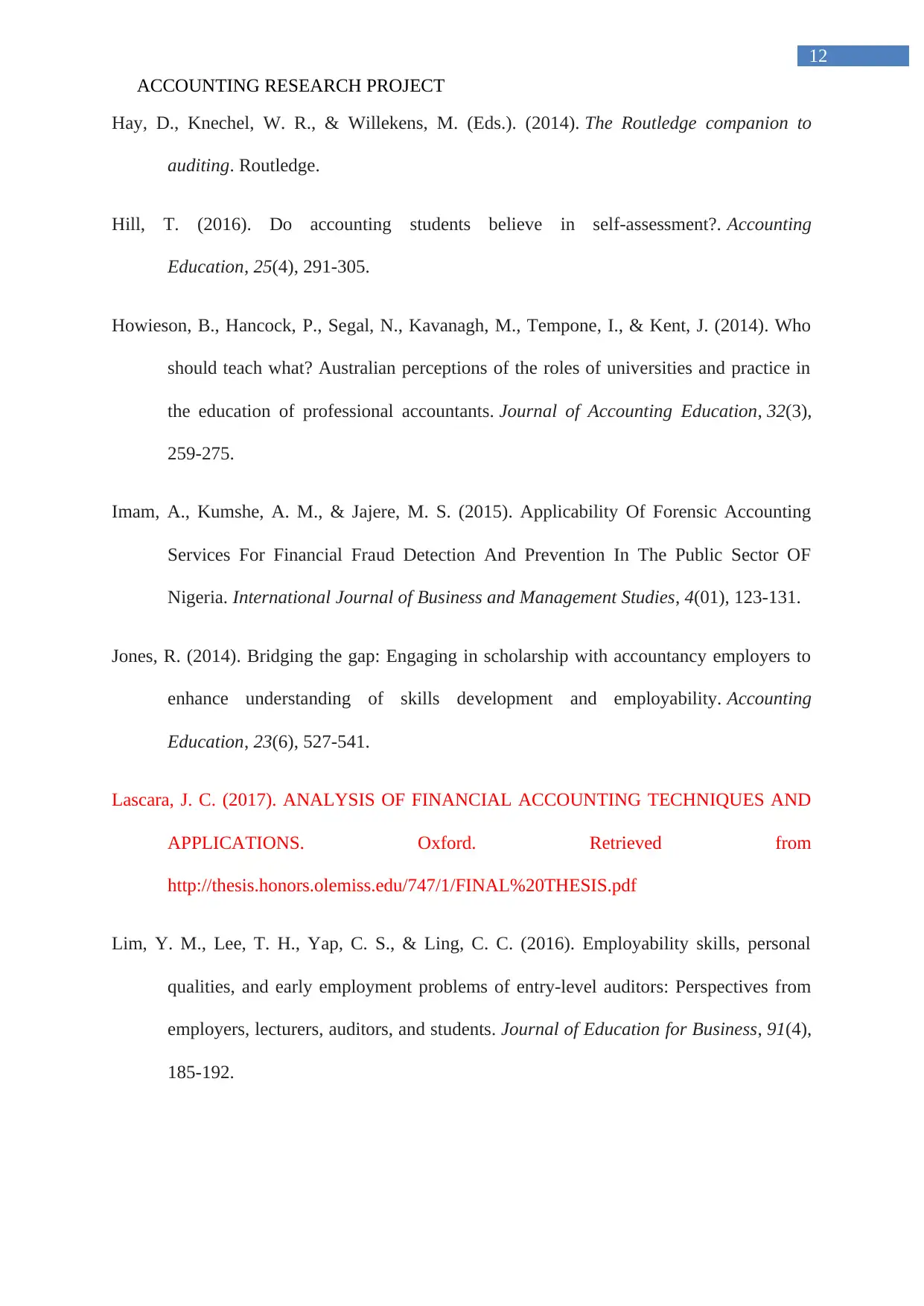
12
ACCOUNTING RESEARCH PROJECT
Hay, D., Knechel, W. R., & Willekens, M. (Eds.). (2014). The Routledge companion to
auditing. Routledge.
Hill, T. (2016). Do accounting students believe in self-assessment?. Accounting
Education, 25(4), 291-305.
Howieson, B., Hancock, P., Segal, N., Kavanagh, M., Tempone, I., & Kent, J. (2014). Who
should teach what? Australian perceptions of the roles of universities and practice in
the education of professional accountants. Journal of Accounting Education, 32(3),
259-275.
Imam, A., Kumshe, A. M., & Jajere, M. S. (2015). Applicability Of Forensic Accounting
Services For Financial Fraud Detection And Prevention In The Public Sector OF
Nigeria. International Journal of Business and Management Studies, 4(01), 123-131.
Jones, R. (2014). Bridging the gap: Engaging in scholarship with accountancy employers to
enhance understanding of skills development and employability. Accounting
Education, 23(6), 527-541.
Lascara, J. C. (2017). ANALYSIS OF FINANCIAL ACCOUNTING TECHNIQUES AND
APPLICATIONS. Oxford. Retrieved from
http://thesis.honors.olemiss.edu/747/1/FINAL%20THESIS.pdf
Lim, Y. M., Lee, T. H., Yap, C. S., & Ling, C. C. (2016). Employability skills, personal
qualities, and early employment problems of entry-level auditors: Perspectives from
employers, lecturers, auditors, and students. Journal of Education for Business, 91(4),
185-192.
ACCOUNTING RESEARCH PROJECT
Hay, D., Knechel, W. R., & Willekens, M. (Eds.). (2014). The Routledge companion to
auditing. Routledge.
Hill, T. (2016). Do accounting students believe in self-assessment?. Accounting
Education, 25(4), 291-305.
Howieson, B., Hancock, P., Segal, N., Kavanagh, M., Tempone, I., & Kent, J. (2014). Who
should teach what? Australian perceptions of the roles of universities and practice in
the education of professional accountants. Journal of Accounting Education, 32(3),
259-275.
Imam, A., Kumshe, A. M., & Jajere, M. S. (2015). Applicability Of Forensic Accounting
Services For Financial Fraud Detection And Prevention In The Public Sector OF
Nigeria. International Journal of Business and Management Studies, 4(01), 123-131.
Jones, R. (2014). Bridging the gap: Engaging in scholarship with accountancy employers to
enhance understanding of skills development and employability. Accounting
Education, 23(6), 527-541.
Lascara, J. C. (2017). ANALYSIS OF FINANCIAL ACCOUNTING TECHNIQUES AND
APPLICATIONS. Oxford. Retrieved from
http://thesis.honors.olemiss.edu/747/1/FINAL%20THESIS.pdf
Lim, Y. M., Lee, T. H., Yap, C. S., & Ling, C. C. (2016). Employability skills, personal
qualities, and early employment problems of entry-level auditors: Perspectives from
employers, lecturers, auditors, and students. Journal of Education for Business, 91(4),
185-192.
⊘ This is a preview!⊘
Do you want full access?
Subscribe today to unlock all pages.

Trusted by 1+ million students worldwide
1 out of 14
Your All-in-One AI-Powered Toolkit for Academic Success.
+13062052269
info@desklib.com
Available 24*7 on WhatsApp / Email
![[object Object]](/_next/static/media/star-bottom.7253800d.svg)
Unlock your academic potential
Copyright © 2020–2026 A2Z Services. All Rights Reserved. Developed and managed by ZUCOL.


